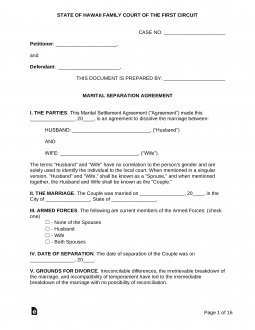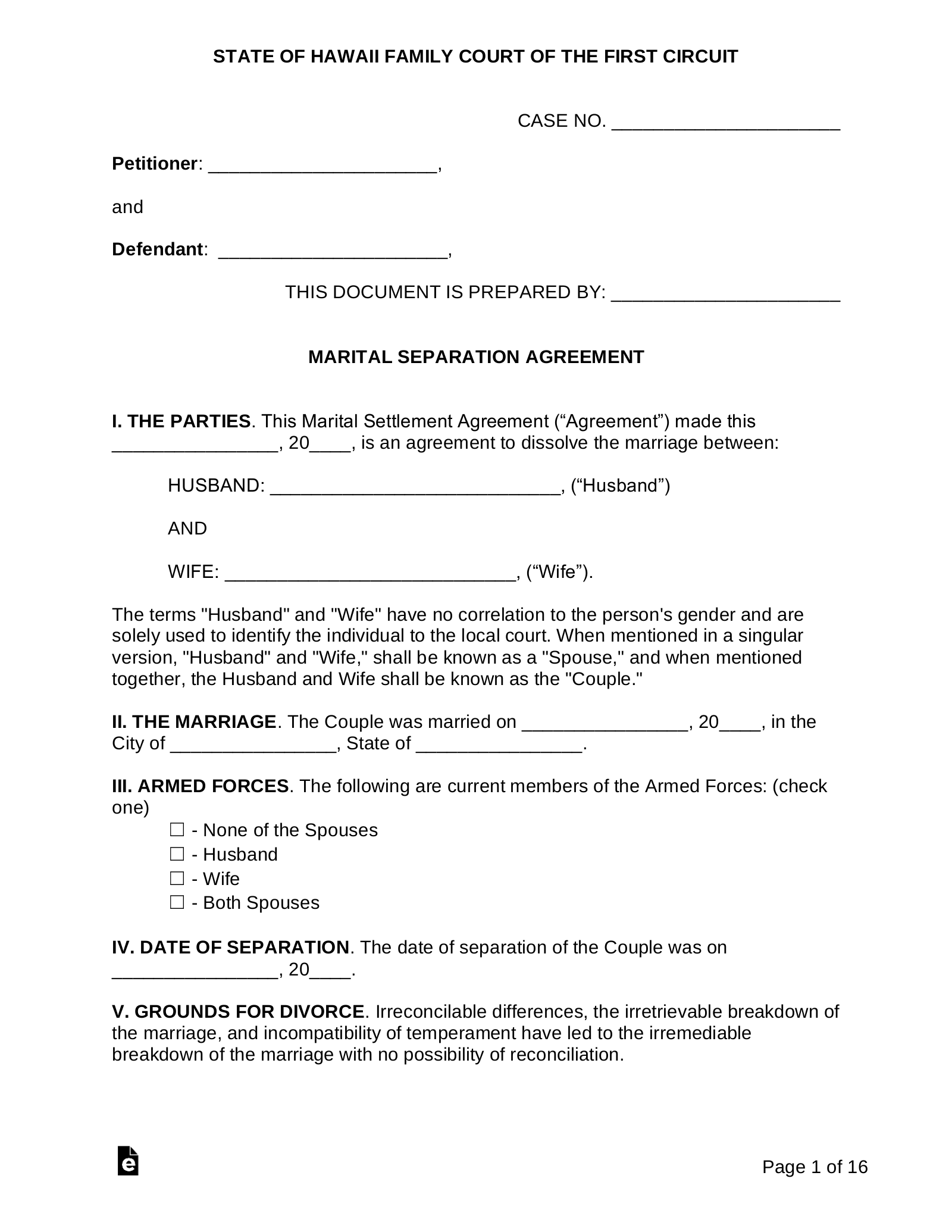Updated January 12, 2024
A Hawaii marital settlement agreement allows married couples to make decisions pertaining to their divorce and grants them the power to control the outcome of their property after marriage. Couples must be willing to negotiate terms in order to establish a settlement that is acceptable to both parties. Conditions such as alimony, child support, parenting rights, and the division of assets must be considered and agreed upon. Most settlement agreements will be accepted by the court in uncontested cases. However, some judges may refuse the settlement terms if they offer an unjust advantage to one spouse over the other. For the sake of transparency and to ensure that the judge will accept the settlement terms, the spouses should provide each other with a disclosure of their current income, assets, expenses, and debts.
Table of Contents |
Divorce Laws
Alimony (§ 580-47(a))
When awarding alimony, the court will take the following factors into consideration:
- The financial resources of each spouse;
- The ability of the spouse seeking alimony to meet their needs independently;
- The length of the marriage;
- The living standard established while married;
- The age of each spouse;
- The emotional and physical state of each spouse;
- The usual occupation of each spouse while married;
- The employability and vocational skills of the spouse seeking alimony;
- The needs of each spouse;
- The child care and child support responsibilities of each spouse;
- Whether the spouse from whom alimony is sought can meet their needs while supporting the other spouse;
- The financial condition in which each spouse will be left after a determination for alimony is made by the court; and
- The estimated duration that alimony will be needed by the spouse seeking support.
Alimony Calculator – calculators.law
Child Support (§ 576D-7)

A spouse’s child support obligations will be determined based on these guidelines.
Child Support Calculator – www.alllaw.com
Division of Property (§ 580-47(a))
Hawaii courts use equitable distribution law to divide property. This means that the couple’s assets and liabilities will not be separated equally, but will instead be separated according to what the court deems fair and just.
Grounds for Divorce (§ 580-41)

In granting a divorce, a judge must find that one (1) or more of the following grounds have been met:
- The marriage has irretrievably broken down;
- The spouses have separated and lived apart under a decree of legal separation (known as “from bed and board”), the separation term has expired, and the spouses haven’t reconciled;
- The spouses have separated and lived apart for two (2) or more years under a decree of separate maintenance, and the spouses haven’t reconciled; or
- The spouses have separated and lived apart continuously for two (2) or more years before filing for divorce, it is unlikely that cohabitation will resume, the divorce would not be oppressive or harsh to the spouse from whom divorce is sought, and the divorce would not oppose public interest.
Interim Support (§ 580-9)

After a divorce has been filed, the court may award either spouse temporary support while the case is pending.
Residency (§ 580-1)
The applicant for divorce must reside in Hawaii for three (3) consecutive months.
How to File for Divorce in Hawaii

- Where to File – Family Court
- Filing Fee – $215 (No Children); $265 (With Children)
- How Long Does it Take? Thirty (30) to Ninety (90) days (source: 3stepdivorce.com)
The paperwork needed to file for divorce in Hawaii depends on where the case is filed and whether the couple has any minor children. Individuals may select from the links below to gain access to the requisite divorce documents and instructions about the proper filing procedures for their judicial circuit.


